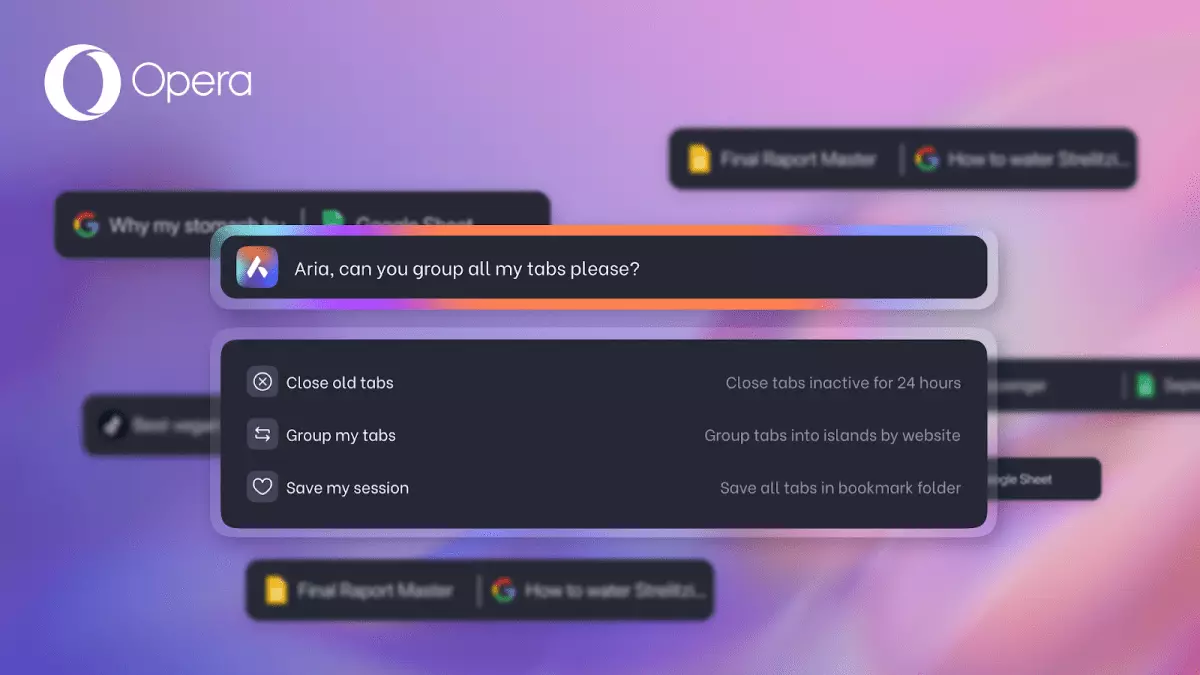In an era dominated by rapid digital communication and extensive online browsing, managing an excessive number of browser tabs can become a daunting task for users. Recognizing this challenge, Opera has introduced a groundbreaking AI-powered feature that facilitates tab management through natural language processing. This feature offers a fresh approach to enhancing user experience, enabling individuals to interact with their tabs as effortlessly as they would conduct conversations.
With this new functionality, users can engage directly with their browser, issuing commands that streamline their navigation. By invoking the Aria command bar through keyboard shortcuts—Ctrl + / for Windows or Cmd + / for Mac—users can execute simple requests. Commands such as “Group all video tabs” or “Bookmark all currently open tabs” can significantly reduce digital clutter. This interactive approach represents a monumental shift from the traditional method of tab management, allowing users to manage multiple tabs using dynamic language rather than navigating through menus.
One of the most appealing aspects of Opera’s new feature is the emphasis on privacy and security. The processing of natural language commands occurs entirely on the client side, meaning that no inconspicuous data is transmitted outside the user’s device. This is a significant consideration in today’s privacy-conscious environment, as users increasingly seek assurance that their data remains secure while they navigate through myriad online pages. By maintaining all processing locally, Opera positions itself as a trustworthy option amid the sea of browsers, appealing to users who value their digital privacy.
The capability to issue tailored commands adds another layer of convenience to the browsing experience. Users can specify requests based on the type of information they have open, such as instructing the browser to “Close my YouTube tabs” or “Group all my shopping tabs.” This specificity allows for a more personalized browsing experience, accommodating the diverse needs of users who may juggle work-related content alongside personal interests.
For individuals who regularly navigate a labyrinth of tabs—where work-related tasks often intersect with personal pursuits—this feature becomes a vital tool for improving productivity. While simply organizing tabs won’t reduce their number, it certainly helps maintain clarity and order amidst the chaos of digital distractions. Opera’s innovation in tab grouping and simplification of browser interaction empowers users to approach their online activities with renewed focus.
As part of its ongoing development, Opera has signaled intentions to enhance its browsing capabilities further, building upon previous iterations like Opera One, which introduced the innovative Tab Islands feature. Such continuous improvements showcase Opera’s commitment to evolving its platform in line with user expectations and technological advancements. As this AI-driven feature rolls out more broadly, it has the potential to redefine the tab management landscape across various web browsers.
Opera’s introduction of an AI-powered command system marks a significant step in simplifying the browsing experience. By placing the power of tab management directly into the hands of the users through natural language commands, Opera not only enhances functionality but also emphasizes privacy and personalization. As this feature transitions from the developer version to general release, it stands poised to revolutionize how users interact with their browsers, making tab clutter a concern of the past.


Leave a Reply